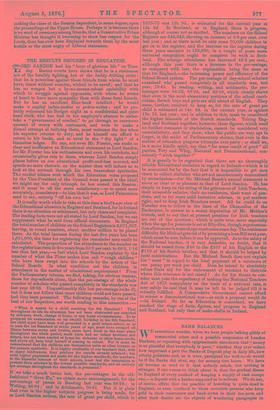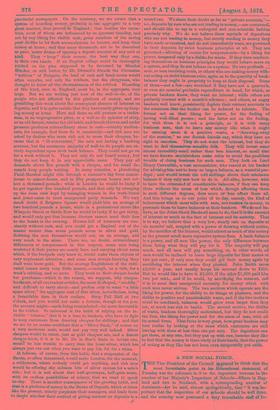BANK BALANCES.
WE sometimes wonder, when we hear people talking glibly ,of commercial crises and a possible suspension of London Bankers, or repeating with epigrammatic unconcern that" money is so plentiful that everybody is poor," whether they ever reflect how important a part the Banks of Deposit play in daily life, how utterly prOstrate and, as it were, paralysed the well-to-do would be if the Banks did shut, say, for seventy-two hours. We have all become so used to it that nobody minds, but nothing is stranger, if one comes to think about it, than the gradual disuse in England of every method of keeping a supply of cash except one,—a deposit with a banker supposed to be solvent. We do not, of course, affirm that the practice of hoarding is quite dead in England, or even confined to those eccentric persons who keep gold in their mattrasses and bank-notes in their tea-pots, and after their deaths are the objects of wondering paragraphs in
provincial newspapers. On the contrary, we are aware that a system of hoarding money, probably in the aggregate to a very great amount, does prevail in England ; that besides the eccen- trics, most of whom are influenced by an ignorant timidity, and not by any lilting for visible cash, great numbers of the saving poor dislike to let their accumulations be known, and keep their motley at home ; and that many thousands, not to be described as peor, never dream of opening a deposit account of any sort or kid. They " keep " their money, the best way they can, hi their own hands. If an English village could be thoroughly robbed on the plan supposed to be favoured by Marshal Bhmher, or still better, by Mr. Disraeli's friends the Circassian " settlers " of Bulgaria, the haul of cash and bank-notes would often surprise, not only the robbers, but the clergyman, who thought he knew all the circumstances of the robbed. Hoarding of this kind, even in England, must be, in the aggregate, very large. But we are writing just now of the well-to-do, of the people who are affected by this plethora of money, and are grumbling this week about the consequent absence of interest on deposits, and it is quite certain that they have nearly given up keep- ing money at home. Here and there an old yeoman or a trades- Man, in an unprogressive place, or a well-to-do spinster of sixty, or an old farmer, retains the old habit, and dreads thieves, and under pressure produces extraordinary sums in cash—country auction- eers, for example, find them do it constantly—and rich men are asked by dealers who seem rich not to cross their cheques, be- cause that is "ill-convenient," the men not having a banking account, but the enormous majority of well-to-do people are en- tirely dependent upon their bank balance. They could not go on for a week without it. They not only do not hoard money, but they do not keep it in any appreciable sums. They pay all demands above five pounds with a cheque, and for small de- mends keep people waiting. In many counties, a plundering Field-Marshal might ride through a summer's day from manor- house to manor-house, and in fifty prosperous homes not col- lect a thousand pounds ; while in London he would be lucky if he got together five hundred pounds, and that only by sweeping up the loose cash kept by managing women in the work-boxes and jewel-cases to meet unexpected petty demands. We very much doubt if Belgrave Square would yield him an average of two hundred pounds a house, while in a professional street like Wimpole Street or Savile Row he would be lucky if he got thirty, and would only get that because doctors cannot send their fees to the banks in the evening. Houses full of treasures are con- stantly without cash, and you could get a Raphael out of the master sooner than seven pounds seven in silver and gold. Robbing the men themselves would not, on an average, add very much to the store. There are, no doubt, extraordinary differences of temperament in this respect, some men being wretched if their purses are nearly bare, and carrying about sums which, if the footpads only knew it, would make them objects of very unpleasant attention ; and some men always fancying they shall want loose gold. But the average Englishmen of the culti- vated classes carry very little money,—enough, as a rule, for a week's cabbing, and no more. They trust to their cheque-books for purchases—which is the reason, we suppose, why cheque- books are, of all convenient articles, the most ill-shaped, " muddly," and difficult to carry about—and profess only to want "a little spare silver," the aggregate cost of that silver, nevertheless, being a formidable item in their outlays. Strip Pall Mall at two o'clock, and you would not make a fortune, though at ten p.m. the account might—cards being remembered—be more favourable to the robber. So universal is the habit of relying on the in- visible "balance," that it is a bore to bankers, who have to fight to keep customers from drawing cheques for shillings ; and that we are by no means confident that a "Silver Bank," of course on a very moderate scale, would not pay very well indeed. Silver cheques would be taken, just as gold cheques are, and a decent cheque-book, if it is in Mr. De la Rue's brain to invent one, woula be less trouble to carry than the loose silver, which has always just run out when you want to pay 13s. 9d. for a whim.
It follows, of course, from this habit, that a suspension of the Banks, so often threatened, would make London, for the moment, a wilderness, where nobody could get anything, and rich men would be offering shy cabmen bits of silver spoons for a mile's ride ; but it is not about that half-grotesque, half-grim scene, with its endless possibilities of misery, that we want to speak to-day. There is another consequence of the growing habit, and that is a plethora of money in the Banks of Deposit, which at times like the present, utterly perplexes their managers, and leads them to doubt whether their method of giving interest on deposits is a ' sound one. We share their doubt as far as "private accounts," — i.e., deposits by men who are not trading in money,—are concerned, and should like to say in a colloquial and non-scientific fashion precisely why. We do not believe these myriads of depositors who are not trading in money, but merely sending in money they have made or received, and do not immediately want, are governed in their deposits by strict business principles at all. They are governed—allowing of course for temperaments—by a liking for power, tempered only by -a dislike for waste. If they were conduct- ing themselves on business principles they would behave more on a system, and they do not behave on a system. No two professis men, or men receiving rents, or others who are making money with- out acting on striet business rules, agree as to the quantity of bank- balance they ought in propriety to keep at their disposal. Some of them—not a few—are wretched if they have not a quarter's, or even six months' probable expenditure in hand, for which, as private bankers know, they want no interest ; while others are perfectly content with a month's advance ; and others, as angry bankers well know, persistently deplete their current accounts to the minimum that the banker can be induced to tolerate. The former act on their liking for power, for the feeling of having well-tilled purses ; and the latter act on the feeling, for with them it is not a principle, as it is with many business men, that to leave any money idle when it might be earning more is a positive waste, a "throwing-away of the mercies," ss or Scotch friends say, which they have no right to sanction. They &mot want the interest, but they do want to feel themselves sensible folk. They will invest sums almost incredibly small rather than lose interest, so small that we have known atockbrokeris make rules to avoid the profitless trouble of doing business for such men. They look on Lord Henry Cavendish, a 'vast -accumulator, -who roared at his banker for advisinghirn notlo leep -so largea balance, as a wasteful pro- digal ; and would invest the odd shillings above their minimum balance if they only saw how to do it. All alike, however, wish to have the command of considerable balances, if they can keep them without the sense of lots which, though affecting them in such different degrees, does more or less affect them all. And this brings us to our point of to-day, namely, the kind of inducement which most tells With men, not tradera in money, to persuade them to leave balances at their bankers. We-do not be- lieve, as the Joint-Stock Banks all seem to do, that it isthe amount of interest so much as the fact of interest and its security. That is to say, we believe that a very low, steady rate on deposits at six months' call, ooupled with a power of drawing without notice, by the sacrifice of the interest, would attract as much of this money as the present much more expensive system does. A bank-balance is a power, and all men like power, the only difference between them being what they will pay for it. The majority will pay much, and all men will pay something, or, in other words, all men would be inclined to leave large deposits for their means at two per cent., if only sure they could get their money again by sacrificing the interest when they pleased. John Smith saves £2,000 a year, and usually keeps his account down to £400. But he would like to have it £2,000, if the other £1,600 paid him two per cent., and if he could, by sacrificing the interest, call it in to meet that unexpected necessity for money which with such men never arrives. The two motives which operate are the liking for power, for the ability to do things at pleasure, and the dislike to positive and unmistakable waste, and if the two motives could be combined, balances would grow even larger than they are, at much less risk to banks. The second motive, the dislike of waste, bankers thoroughly understand, but they do not credit the first, the liking for power and for the sense of ease, with all its actual force. That force is very great, how great bankers may best realise by looking at the sums which customers are still leaving with them at less than one per cent. The depositors can get three, at any rate, but they put up with one, because they like to feel that the money is there ready at their hands, that the power of acting as they like has not been even temporarily put aside.































 Previous page
Previous page